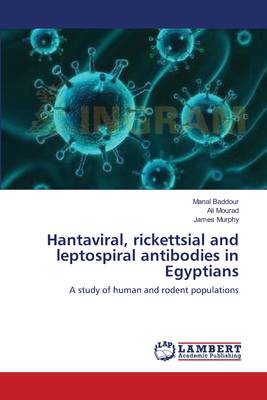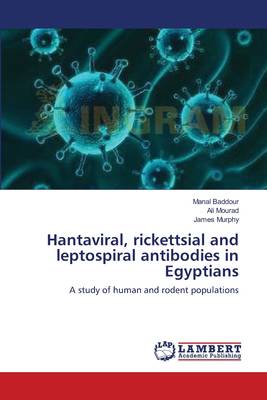
- Afhalen na 1 uur in een winkel met voorraad
- Gratis thuislevering in België vanaf € 30
- Ruim aanbod met 7 miljoen producten
- Afhalen na 1 uur in een winkel met voorraad
- Gratis thuislevering in België vanaf € 30
- Ruim aanbod met 7 miljoen producten
Zoeken
Hantaviral, rickettsial and leptospiral antibodies in Egyptians
A study of human and rodent populations
Manal Baddour, Ali Mourad, James Murphy
Paperback | Engels
€ 88,45
+ 176 punten
Omschrijving
Hantaviruses are zoonotic, rodents being the reservoir of the viruses and source for human infections. Several strains of hantaviruses exist in different geographical locations around the world causing several clinical conditions. Exposure to rodent excreta is the mode of transmission. They can cause serious diseases in humans. The current publication is the first and probably the only study tackling evidence of Hantavirus infection in humans and in rodents trapped in the coastal city of Alexandria, Egypt. Since rodents are sources of other infections to humans such as rickettsia and leptospira, human sera and sera from trapped rodents were also tested for antibodies to these 2 bacteria as well. This work has been a Ph.D dissertation carried out in Alexandria University as a joint project with NAMRU-III
Specificaties
Betrokkenen
- Auteur(s):
- Uitgeverij:
Inhoud
- Aantal bladzijden:
- 188
- Taal:
- Engels
Eigenschappen
- Productcode (EAN):
- 9783659107276
- Verschijningsdatum:
- 4/05/2012
- Uitvoering:
- Paperback
- Afmetingen:
- 152 mm x 220 mm
- Gewicht:
- 281 g

Alleen bij Standaard Boekhandel
+ 176 punten op je klantenkaart van Standaard Boekhandel
Beoordelingen
We publiceren alleen reviews die voldoen aan de voorwaarden voor reviews. Bekijk onze voorwaarden voor reviews.







